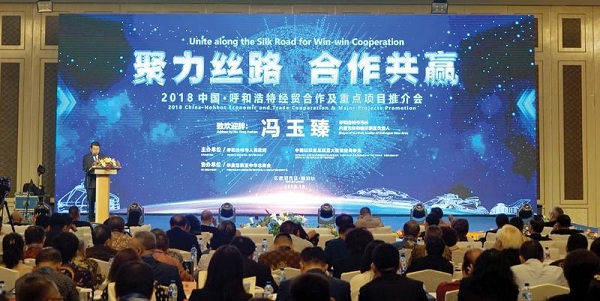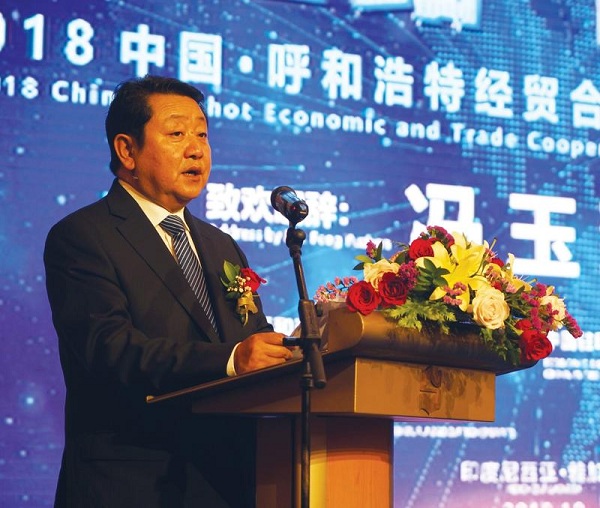Hohhot, Jakarta to forge closer ties

Hohhot, the capital of North China’s Inner Mongolia autonomous region, held a series of events in Jakarta on Oct 23 to promote economic and cultural links with Indonesia. The events were jointly organized with the Economic and Commercial Counselor’s Office of the Chinese embassy in Indonesia and the Indonesian Chinese Entrepreneur Association. [Photo by Yang Han/China Daily Asia Weekly]
North China’s green city aims to deepen its cooperation with Indonesia, further exploring the Southeast Asian markets and promoting win-win outcomes.
“Indonesia is the biggest economy in Southeast Asia and the biggest country in the Association of Southeast Asian Nations (ASEAN),” said Hohhot Mayor Feng Yuzhen. “Representing around 40 percent of ASEAN’s land, population and economic output, it plays an important role in the regional as well as global economy, which promises great potential for future development and cooperation.”
Hohhot, or the “Green City” in the Mongolian language, is the capital of Inner Mongolia autonomous region in northern China. As an important node in the Belt and Road Initiative (BRI), it serves as China’s gateway to North Asia and the bridge that connects the China-Mongolia-Russia Economic Corridor.
The concept of the 21st Century Maritime Silk Road, which forms the BRI along with the Silk Road Economic Belt, was proposed by Chinese President Xi Jinping in 2013 in Indonesia.
To enhance mutual communication and deepen collaboration in various sectors, the city government held a series of events in Jakarta on Oct 23 to promote cooperation in economics and trade as well as tourism. The events were jointly organized with the Economic and Commercial Counselor’s Office of the Chinese embassy in Indonesia and the Indonesian Chinese Entrepreneur Association (PERPIT).
Speaking to over 500 participants that included government officials and business leaders from China and Indonesia, Feng said industrial development in Hohhot and Indonesia is different but complementary. He said this offers huge opportunities for cooperation in the fields of economic affairs and trade, technology, tourism and culture.
Spanning an area of about 17,200 square kilometers, Hohhot is an important hub that connects the northeastern, western and northwestern parts of China. With a population of around 3.12 million, it is home to 42 ethnic groups which include both Mongolians and Hans.
“In recent years, Hohhot (has followed) the development concepts of innovation, coordination, green and openness,” said Feng.
“Based on our advantages in location, resources, technology, talent, environment and policy, we have been putting great effort into economic transformation and innovative development, fostering a wide range of pillar industries in green food processing, energy, petrochemicals, new materials, biomedicine and electronic information.”

Feng Yuzhen, Hohhot mayor [Photo by Yang Han/China Daily Asia Weekly]
Home to dairy giants Yili and Mengniu, the city is also known as the “Dairy capital of China”. The production value of the two local enterprises has exceeded 120 billion yuan ($17.3 billion) in 2017, ranking eighth and tenth, respectively, among global dairy product manufacturers, said Feng.
In addition, emerging industries such as big data, cloud computing, artificial intelligence and equipment manufacturing now account for nearly 30 percent of the city’s entire industrial sector, turning these into the new engines of the region’s economic development, said Feng.
For example, the number of big data servers has reached 700,000 in Hohhot, to rank it first in China. The production capacity of monocrystalline silicon wafers reached 25 GW, giving it the top ranking worldwide, according to Feng.
A State-level new area — Inner Mongolia Horinger New Area — was also established in 2017 as the core area of big data and other innovative and emerging industries in the autonomous region.
“China has been one of Indonesia’s largest sources of investment in the last five years … and we expect the (investment value will continue) to grow in the future,” said Andi Maulana, deputy chairman for Investment Promotion at Indonesia Investment Coordinating Board (BKPM).
Maulana hopes more investors from China, especially those from Hohhot at the event, can inject new energy into Indonesia’s economic growth. The attractive investment fields include agriculture, technology, and tourism among others.
It is expected that $424.5 billion will be needed for Indonesia’s National Medium Term Development Plan 2015-2019, which requires an abundance of capital and mature techniques, said Xue Tianzeng, vice president of PERPIT.
The ambitious development plan laid out by Indonesian President Joko Widodo aims to build 1,000 kilometers of roll roads, 5,000 km of railways, as well as 15 airports and 24 seaports.
Xue said more Chinese enterprises with the requisite funds should participate in the economic development of Indonesia.
Though the Chinese mainland is now Indonesia’s third largest source of investment, the country is the biggest investor in Indonesia, if one includes investors from Hong Kong and Macao, since many companies would bring their money to Indonesia via their branches in the two special administrative regions, said Wang Liping, minister counselor for economic and commercial affairs at the Chinese embassy in Indonesia.
“Fruitful results have been generated from cooperation between Chinese and Indonesian companies in areas such as mining, agriculture, manufacturing, real estate and the internet,” said Wang.
“The economy and culture of Hohhot is quite unique and the city has developed rapidly in the past few years … it is even being called as the ‘little Hong Kong’ in north China,” said Wang.
He hopes that, through the promotion event, more cooperation between Hohhot and Indonesia can be created in dairy, material, steel and coal industries.
Wu Wenting, vice president and executive director of Inner Mongolia Mengniu Dairy (Group), said the company’s first overseas liquid milk processing factory is expected to launch later this year.
“The tourism resources of Hohhot and Indonesia also complement each other very well, which can generate great impact on and be attractive to both sides,” said Hohhot’s Mayor Feng.
With thousands of islands on its map, Indonesia is the largest archipelago in the world. Its unique tourism resources, natural scenery and distinctive culture make it one of the most desired tourism destinations among Chinese tourists, said Feng.
Meanwhile, Hohhot is famous for its grasslands and its unique culture, and known as one of the birthplaces of Chinese civilization.
“In recent years, the number of visitors between the two countries has increased gradually,” said Feng.
“Last year, the number of Chinese tourists visiting Indonesia exceeded 2 million, accounting for 15 percent of all foreign visitors in Indonesia. China also maintained (its position) as the biggest source of tourists.”
Feng welcomes more people from Indonesia to visit Hohhot, to experience the unique integration of nomadic and farming civilizations as well as the way of life in prairies and central plains.
Indera Dewantho, an official from the Indonesian Ministry of Tourism, said the government aims to attract 2.6 million visitors from China in 2018, which requires the cooperation of all stakeholders.
“The purpose (of our events) is to deepen the friendship between Hohhot and Indonesia and enhance our cooperation, which can not only allow Hohhot to better serve and engage in the BRI, but also connect with Indonesia’s Vision of Global Maritime Fulcrum,” said Feng, who was speaking to China Daily Asia Weekly after the events.
A series of contracts and memorandums of understanding were signed between governments and companies from China and Indonesia during the promotion events.
Feng said the enhanced cooperation will also be conducive for attracting the investment to accompany the all-round opening-up promoted by the autonomous region.
Noting that this year marks the 40th anniversary of China’s reform and opening-up, Feng said the new era of opening-up will provide unprecedented opportunities for cooperation between Hohhot and Indonesia.







